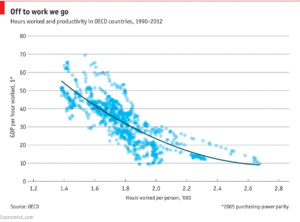5 ways flexible work makes your business more productive.
Alright, so itŌĆÖs probably best we tackle the elephant in the room. There is a feeling, however unfounded, that flexible hours and remote working makes for a less productive workforce.
This does not bear with the facts in the matter.
Time and again, we see the myth that working longer hours means working more productively is just that: a myth. Take, for instance, this Economist graph of OECD nations.

If anything, the conclusion they draw is, obviously within reason, fewer hours worked lead to a more productive workforce. This is how Daisy Chain can help your business; if youŌĆÖre looking for opportunities to expand your flexible working roles, we can help. We can give you access to a large pool of potential candidates, all looking to work flexibly, and all looking to do so productively.
- It reinforces an output based mindset
As previously mentioned, working fewer hours usually means those hours are more productively spent. This bears out, again, even in management perception among those that have actually tried it. This does require, though, a shift in your metrics for success. Instead of evaluating people based on how hard you see them to be working, evaluate deliverables. Shifting your goals from ŌĆ£x number of hours workedŌĆØ to an output-based system (whatever this might entail for your specific business) will signal to your employees that what matters is what they produce. This will improve the general quality of their work, as your business priorities become theirs too.┬Ā
- Healthy workers are productive workers
Presenteeism, turning up to work when youŌĆÖre ill, is the opposite of absenteeism, and has just as many effects on your efficiency, if the Harvard Business Review is to be believed. And this sickness can stretch out to mental health, too. Stressed and burnt-out workers, are present in the office and are therefore believed to be working as hard as anyone else. But the fact of the matter is, theyŌĆÖre usually not. For good reason! Allowing people the flexibility to work in the ways they choose, will give them the freedom to make decisions that benefit their health, and in the end, that benefits you, too.
We have published a blog on how flexible work can help employees deal with burn out; helping your workers deal with burnout is vital for business, too, as lowered well being leads to lowered productivity.
- Rent is a huge expense
Office space is expensive. That should go without saying. Having an increased number of your employees working from home, or job sharing, or one of the many other type of flexible working, allows you to cut on costs associated with real estate rent. At least, that was the experience of EY when they collected a report last year. With fewer employees needing to be in the office, not every employee necessarily needs that desk space all the time. That means you either save money by not renting it out, split it with another company in a coworking arrangement, or diversify how that space is used
No one is suggesting that you get rid of your office space entirely. That would defeat the point of flexible, hybrid work. It should be about empowering people to make decisions that will benefit them. If you find, however, that fewer employees are coming in, it would make sense to cut down on space needed. Having a rota of days when people are in the office, with exceptions are flexibility built in, would mean you always know the amount of space you need.
- Rethink your employee’s priorities; gain improved talent
Or, consider converting that space. WeŌĆÖve all seen the rise of office spaces, like WeWork that offer amenities traditional office spaces donŌĆÖt. Some of the biggest tech startups, Google, Tesla or Apple, for example, offer classes, food, gyms, even massage therapists to their employees. EYŌĆÖs reports also bear this out. The changing world of work has given employees different incentives to follow. That means adjusting your hiring process, to match the changed incentives of potential employees.
This is important, as any good hirer knows; you have to give the right talent the right incentives. If current stats are to be believed, the ability to work from home is increasingly important for a lot of people. If you want to attract the best, you have to give them what they want. A company is only as good as it’s employees, after all.
Daisy Chain is a community of people, all who want to work to their maximum productivity, but need a flexible role to do so. These are invariably experienced employees; parents looking for ways to balance their busy schedules, working professionals who are just looking for a little bit of flexibility from their employers.
Hopefully weŌĆÖre all the on the page now; flexible work allows for more productive workers; so why wait? Start implementing it today!